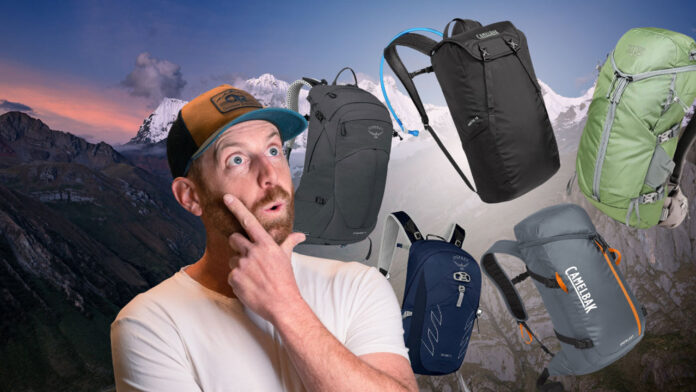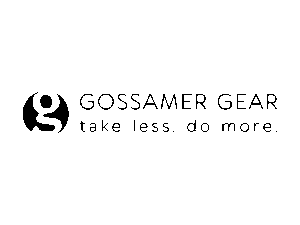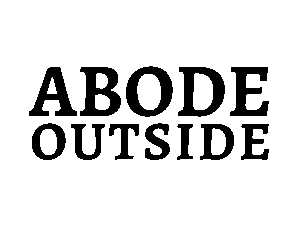Hydration day packs have been booming in popularity amongst hikers and trail runners. Many models on the market differ quite a bit from each other. Want to know that the best hydration pack for hiking is? Great! I'm going to compare 5 of the best-selling hydration packs to give you a better idea of what to expect for your next adventure.
If you're looking for something that can handle longer hikes then check out the Gossamer Gear Loris 25.
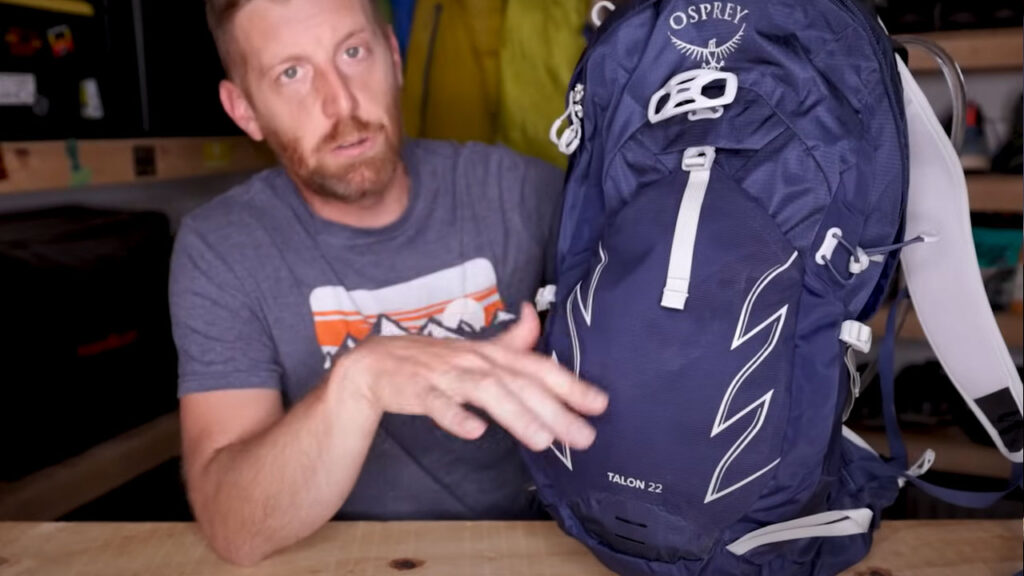
Osprey Talon 22 Review
In my opinion, the Osprey Talon 22 stands out from the lot of competitor hydration packs. It weighs 2.2 pounds, has a 22-liter capacity (total goods, not just water), and retails for $160. I find that the 20-liter range is perfect for hiking-focused hydration packs. Anything more than that and they can get a little cumbersome, clunky, and ultimately, you'd probably be better off just investing in a classic day-hiking backpack.
This pack doesn't actually come with a water bladder. It keeps the price down, but I'd much rather pay a little bit more and not worry about the additional purchase. I'm sure many a hiker has assumed it was included, only to be disappointed the morning of the outing.
Osprey Talon 22 Water Bladder
A sort of medium ding, has to do with the placement of the bladder in the Talon 22. I love how it's stored in a separate compartment, between the main chamber and your back. That way, if you spring a leak, your other stuff has a better chance of not getting fully saturated before you realize what's happened. However, this compartmentalization makes it harder to actually get the bladder in and out when the rest of the bag is packed. But honestly, I'll take that trade off any day. I like that I'm able to sort my gear, and the Talon 22 even has an additional exterior sleeve, for a quick-access rain jacket (or something of the sort.
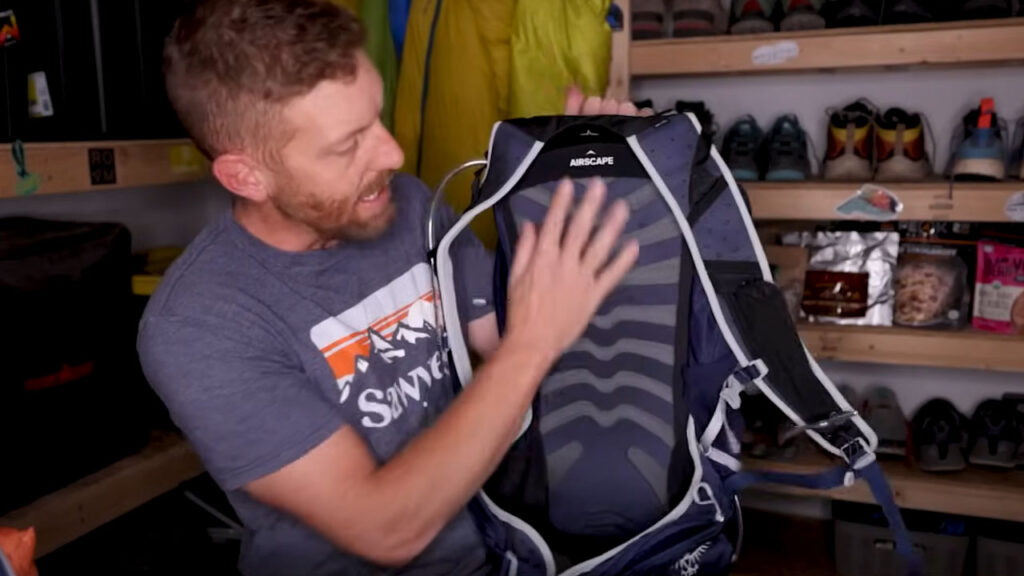
Osprey packs are known for their exceptional airflow. The Osprey Talon 22 is more minimalistic than the average day pack. That's to be expected with smaller packs. It does, however, feature generous hip belt pockets, and a tighter, but still functional shoulder strap pocket (best suited to sunglasses or other small items).
I think this is a great hydration pack to take on those crossover adventures. It's an easy-going day-pack, it's big enough but still light enough for fast-packing/long-distance trail runs (you can even stow your trekking poles very easily on the fly), and there's a helmet lock for you mountain bikers out there.
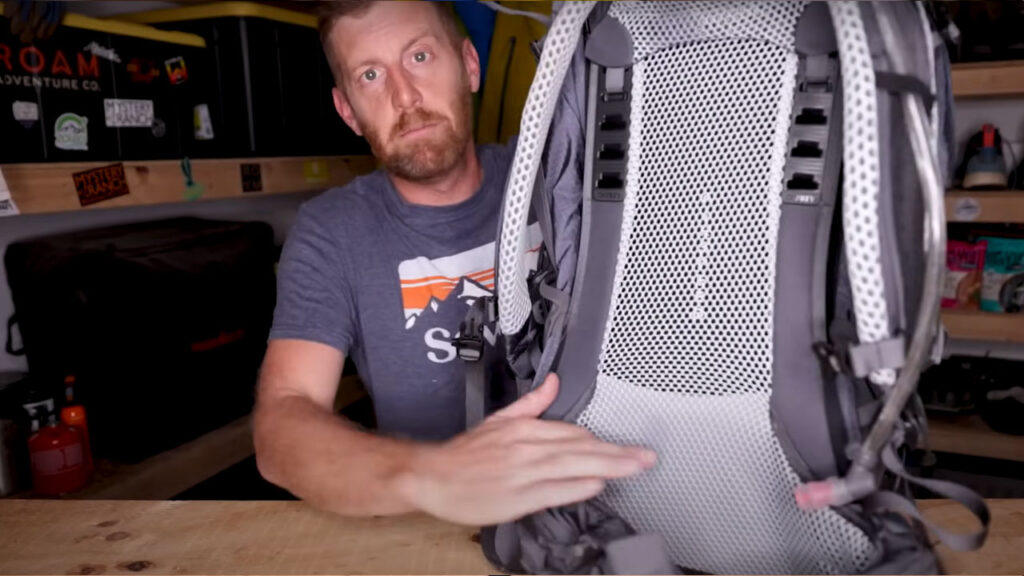
Osprey Stratos 24 Review
Osprey Stratos 24 occupies more of that traditional hiking backpack territory. The first thing that sets it apart is its advanced ventilation system and adjustable yoke. The hip belt is designed to sit lower, meaning it will actually be placed on your hips. I find that a lot of hydration bladders ride up above the belly button. This can be kind of annoying, and also limits performance.
Highest Volume of all these Hydration Packs
The Osprey Stratos 24 also has the highest volume capacity (24 liters) of the bunch. This makes it the most capable of taking on long, single-push adventures, or even multi-day outings that involve sleeping in huts/albergues/pre-established camps. The main compartment is big enough for a sleeping bag, the side pockets are super generous (capable of housing Nalgene bottles), and the additional small pockets come in handy for all the common knick-knacks.
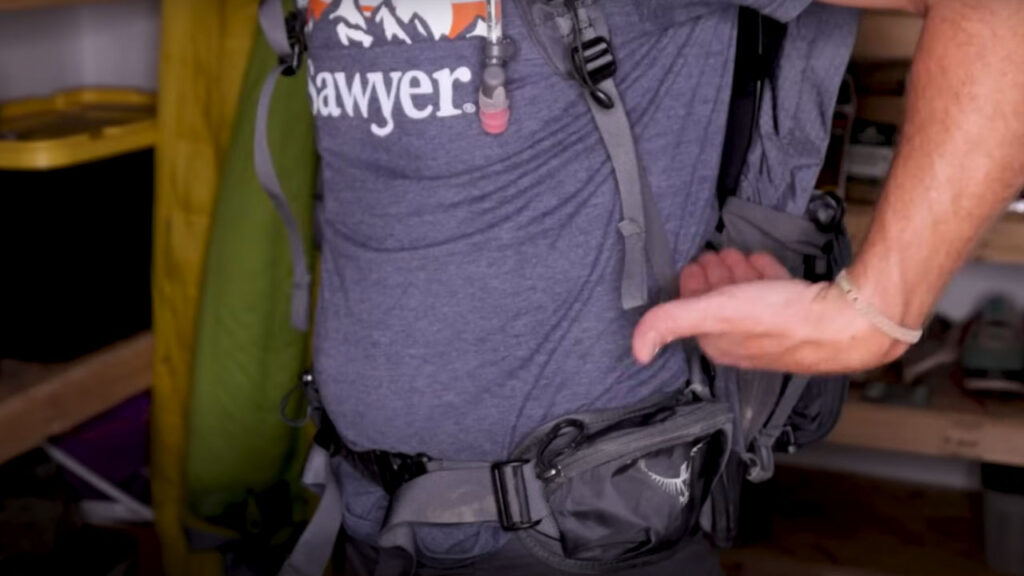
As the YouTube comment section was so kind as to point out on one of my previous videos, Osprey's Stow-on-the-Go trekking pole system is actually easier to use than I first thought. Trekking poles are here to stay, but it's nice to be able to stash them on long stretches of flat terrain.
The side buckles are much-appreciated for securing my tripod. So take note, all you prospective outdoorsy filmmakers.
The Osprey Stratos 24 weighs in at 2.75 pounds and retails for $180 (USD). So even though this is the heaviest and most expensive pack (tied with the Coulee 20, but doesn't include a bladder) on the list, it is also the most robust and feature-rich. The Coulee 20 even includes a raincover. Traditional day hikers will be well-served by the Coulee 20. The day pack designed for those fast and light missions.
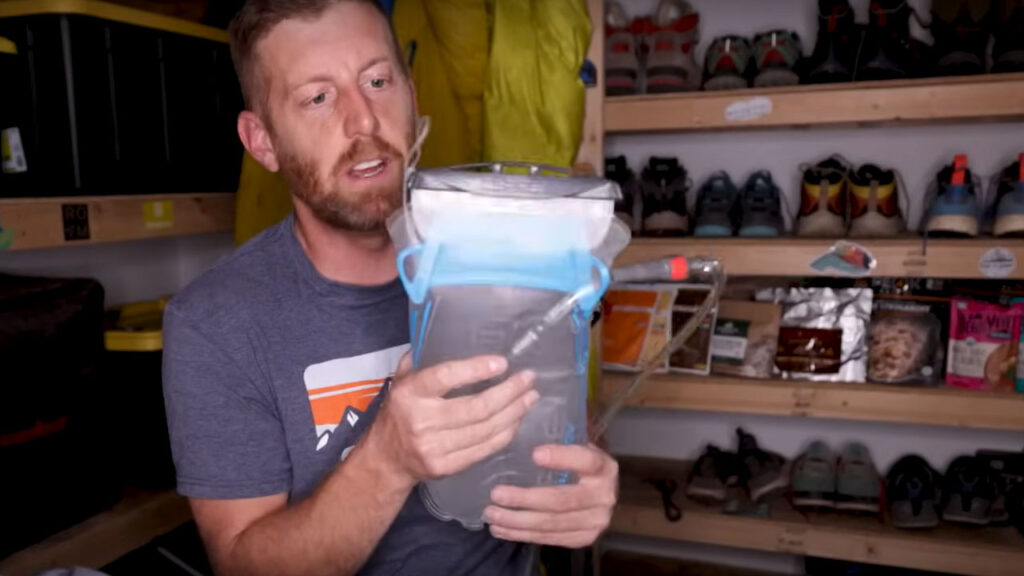
Osprey Water Bladders
The Talon 22 nor the Stratos 24 do not include a water bladder. Osprey sells their own water bladder that can be purchased separately. I'm a fan because I find the bite-valve works well. The hose itself can be easily disconnected from the main bladder. This really helps for draining, drying, and just generally mitigating bacterial build up. This also helps with the loading/unloading problem, as the hose can be ditched until you're all set up and ready to go.
Cons of the Stratos 24
The only thing I don't love is the twist locking mechanism. It works perfectly fine, as long as you can remember if it's in the open or closed position. If left unlocked, you're going to get some leakage on the fly. Osprey also has a fold and seal top closure system for its bladders. I find this to be the most dependable approach – especially compared to the twist top.
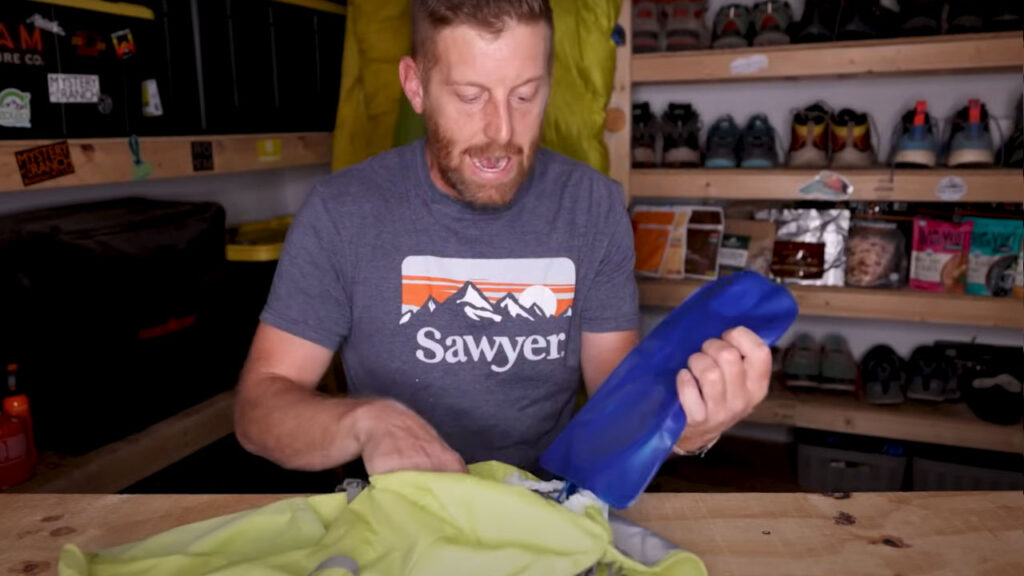
CamelBak Arete 18 Review
The first thing I love about CamelBak hydration packs is that they actually come with a water bladder. What a concept! The CamelBak Arete 18, which is the most straight-forward, minimal pack we'll talk about today, comes with a 1.5L bladder. To be honest, I like to carry at least 2 liters for most hikes, but given how stripped down this one is, I think it's intended more for trail runners.
You can only physically run with so much weight on your back, and mere mortals can only run for a few hours at a time, so I suppose 1.5 is enough for most of the intended outings in the CamelBak Arete 18. Plus, ultra-runners can aim to refill at aid stations, or pre-planned supply stops (or just loop back for home/the parking lot, reload, and head out again).
No Structure to the Arete 18
The CamelBak Arete 18 has almost no structure to it. But that doesn't mean that it's without carrying capacity. There's a lid pocket that is perfect for keys, snacks, and maybe a headlamp. The main chamber can be buckled and synched. And there are two side pockets for stashing other grab n' go items (perhaps even extra water bottles).
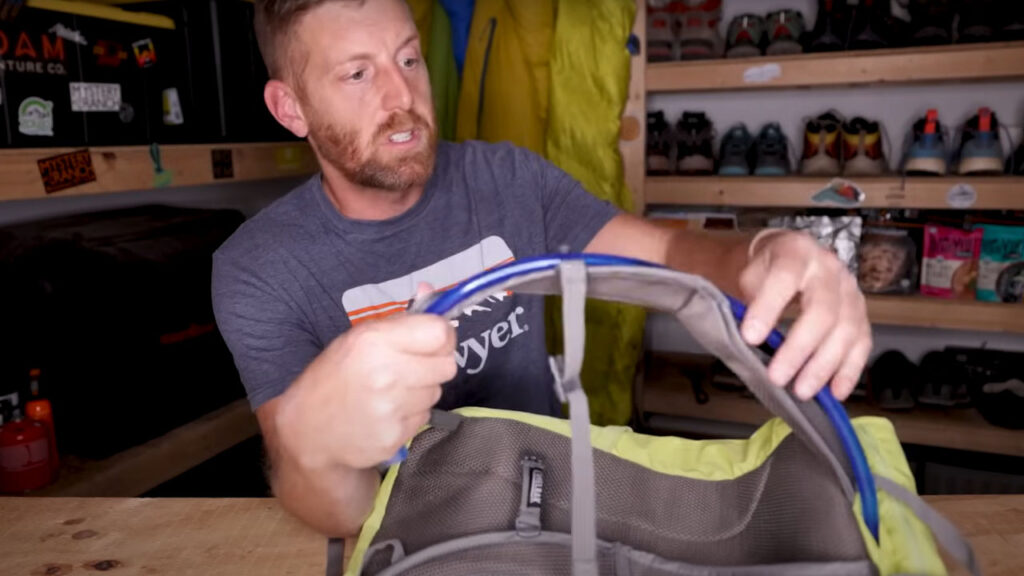
I also appreciate how the CamelBak Arete 18 come with built-in clips to secure the bladder's hose. This is a small design detail that makes a big difference on the trail. Sometimes this is easy to overlook, until you get pounding away and realize that the hose flaps around annoyingly.
On the other hand, the CamelBak Arete 18 only has a chest buckle, not a hip belt. This could lead to some extra sloshiness while on the move. Given that its capacity is lower, this may not be that noticeable for day-hikers. But trail runners might take issue.
To many, the biggest selling points on the CamelBak Arete 18 are its raw specs. It costs only $75 (remember, including the water bladder), and it weighs a mere 11 ounces (300 grams). This makes it, by far, the lightest and cheapest pack on this list.
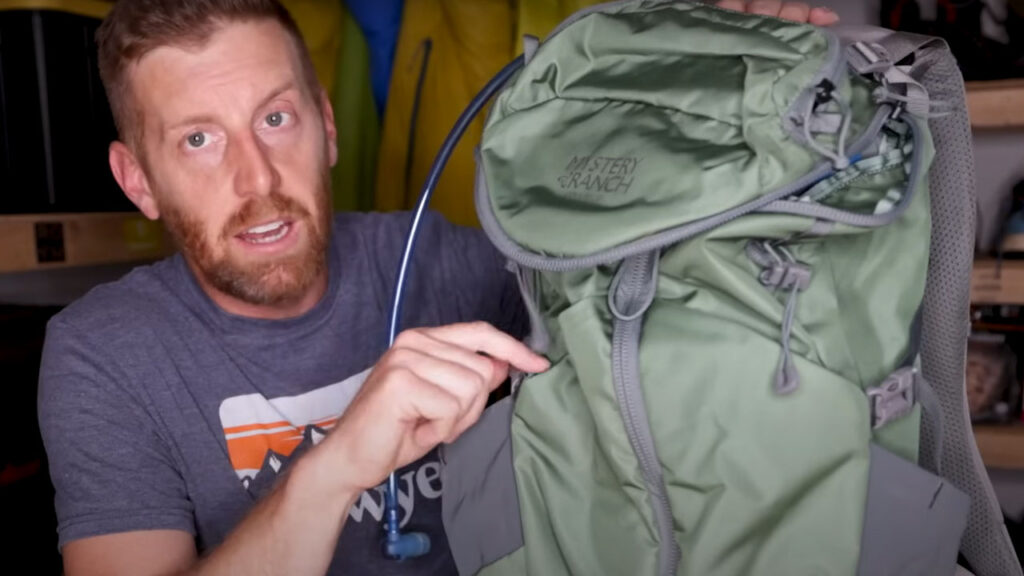
Mystery Ranch Coulee 20 Review
The Mystery Ranch Coulee 20, like the Osprey Stratos 24, is first and foremost, a day-hiking backpack. But I wanted to highlight it because it still applies to this demographic. Plus, I've used it a ton, and am happy to recommend it. This one costs $179 (USD) and weighs 2.6 pounds, so it's at the top end for price and weight, but it is also the one with the best capacity to carry weight (not volume, but certainly weight). And I can't possibly understate the craftsmanship that Mystery Ranch brings to the table.
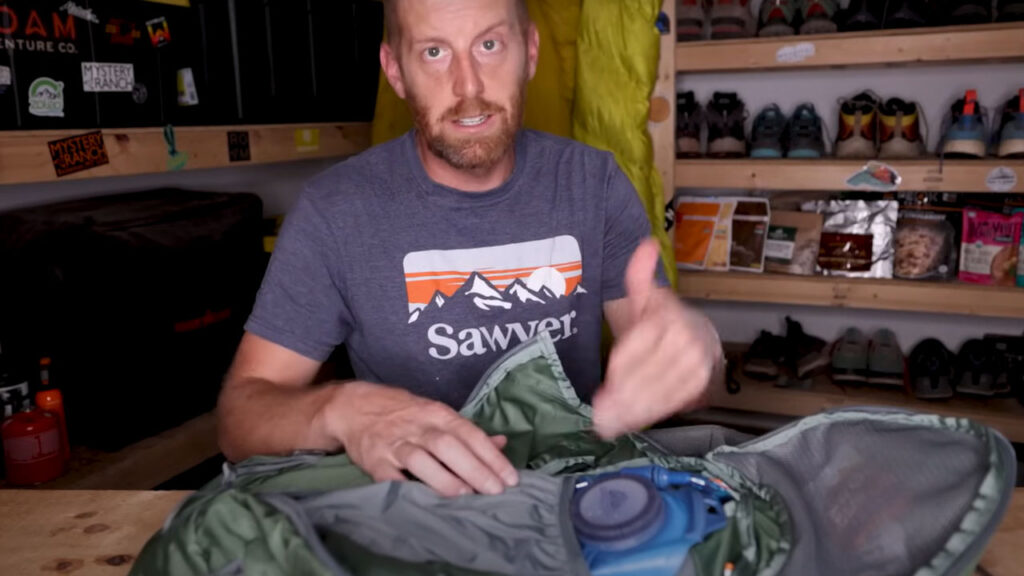
I like how the Mystery Ranch Coulee 20 has a front flay opening. This allows me to quickly access anything in the main chamber of the bag. Personally, I find this the best option for carrying my camera equipment. The Coulee 20 can be adjusted for different torso lengths. With the other ones, you simply get what you get.
Just a heads up, Mystery Ranch doesn't make their own bladders. The Mystery Ranch Coulee 20 is bladder-compatible. You will need to purchase a water bladder from a different brand separately.
If you want to learn more about this day-hiking/hydration pack, check out my Mystery Ranch Coulee 20L and 30L Review.
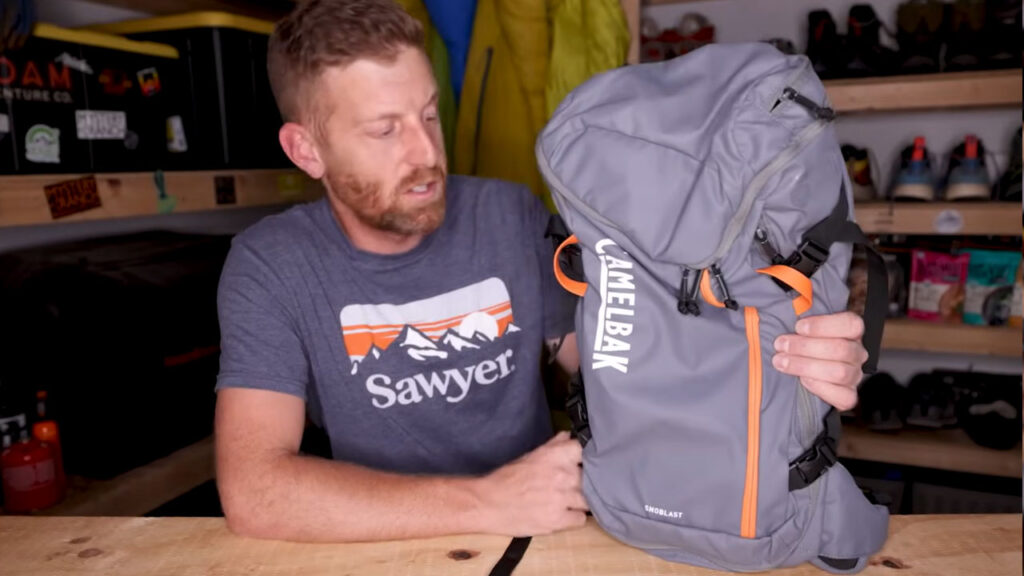
CamelBak SnoBlast 22 Review
Hydration doesn't just apply to hot summer days. And nothing stands firmer against the bitter winter cold than the CamelBak SnoBlast 22. Most bladders struggle when the thermometer drops to below freezing. For once ice forms in the hose, the whole thing becomes useless. To prevent this, the CamelBak SnoBlast 22 wraps the hose in an insulated tube, and then that whole piece tucks into another insulated chamber within the shoulder strap.
The second layer can be unzipped to access water. The second layer can be resealed to keep the water warm and in liquid form. It also helps to keep it out of the way while carving down the ski slopes. Note that the CamelBak SnoBlast 22 does include a bladder. It has a 2-liter volume and also has a detachable hose (totally the way to go in the long run).
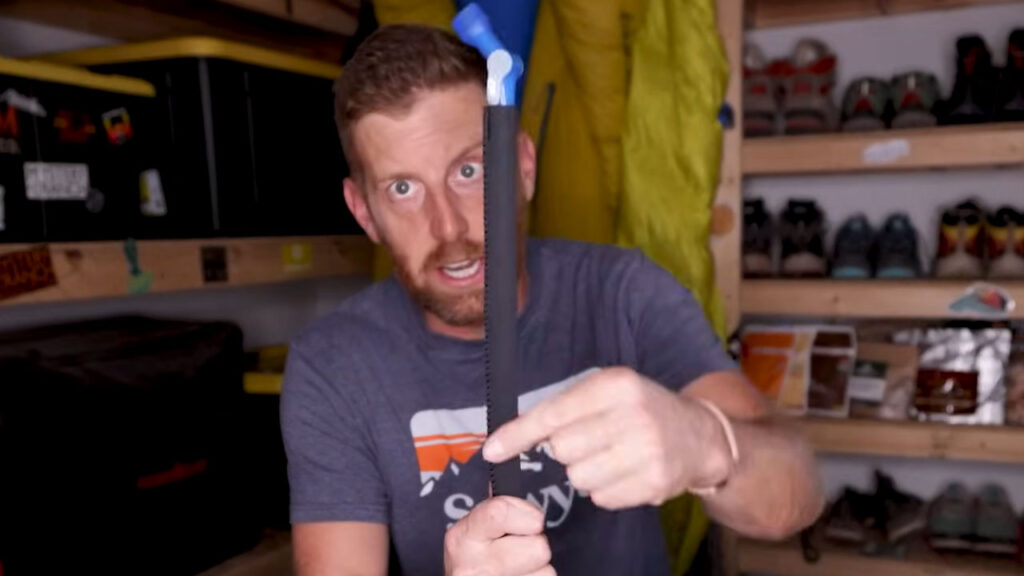
Winter Hydration Pack
The CamelBak SnoBlast 22 can anchor skis on its sides. It also has two loops for anchoring a helmet (which you can do by fishing the strap through each).
Like the Coulee 20, the SnoBlast has a big front open zip, and also some smaller storage options. And, of course, the 22-liter capacity is well-suited for packing extra jackets, mitts, an emergency kit, and all that stuff that comes into play, even more so, when adventuring in the cold. The pack can be expanded to accommodate poofy layers, or compressed when you're wearing all that stuff and just want to move fluidly over the terrain.
This pack is coated in a water resistant material (which certainly comes in handy when frolicking in the snow). And the locking mechanism on the drinking nozzle is super clear and easy to use, even with gloves on. Rather than a twist, it uses an up/down joint. Unfortunately, they combine this with a spin closure top to the bladder. I've soaked my back once or twice because I didn't line up the thread properly with units like this.
The CamelBak SnoBlast 22 retails for $120 (USD) and despite the extra insulation, still only weighs 2.4 pounds. This may be a niche purchase, but it will provide excellent value for winter warriors.
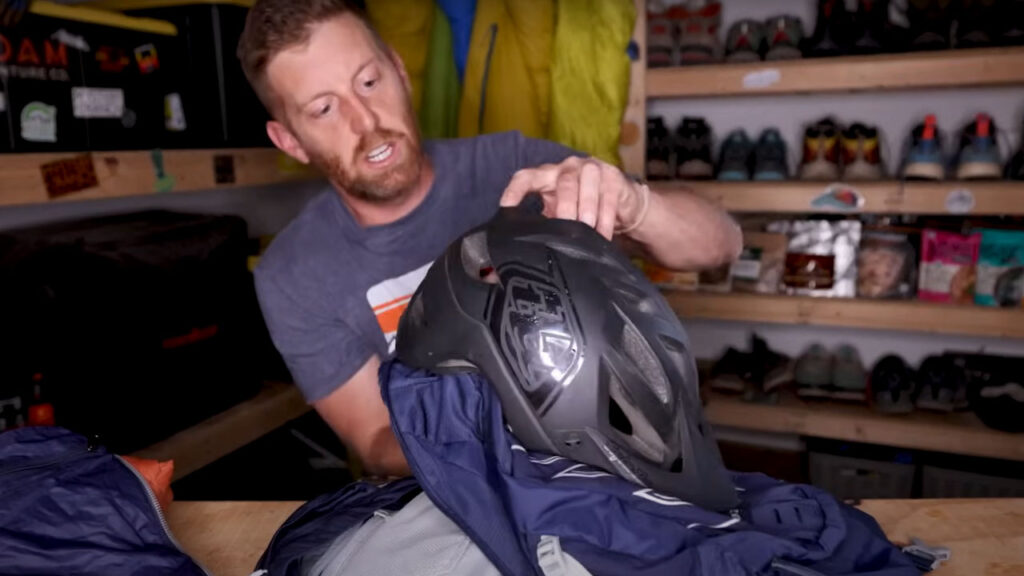
Best Hydration Pack for Hiking?
It's hard to rank these packs, since they all excel in different areas. However, given that the theme of this article is hydration packs, I think the Osprey Talon 22 fits the bill the best.
If you're looking for something that can handle longer hikes then check out the Gossamer Gear Loris 25.
Until next time, stay classy, and stay hydrated!



